The College of Engineering and Computer Science (ECS) is proud to announce the selection of Bryan S. Kim as the inaugural Pramod and Anju Varshney Endowed Faculty Fellow. This endowed fellowship is made possible through a generous gift by Distinguished Professor Pramod K. Varshney and his late wife, Anju Varshney G’86, G’90.
Professor Bryan S. Kim Named as Inaugural Varshney Faculty Fellow
Electrical Engineering and Computer Science Department Chair Alex K. Jones Recognized by IEEE for Academic Innovation
Professor Jones was selected as a 2025 recipient of IEEE’s Technological Innovation Academic Award for his work in novel device technologies, sustainable computing, and embodied energy optimization.
Electrical Engineering and Computer Science Faculty Showcase Quantum Innovation and Academic Opportunities at 2025 Tapia Conference
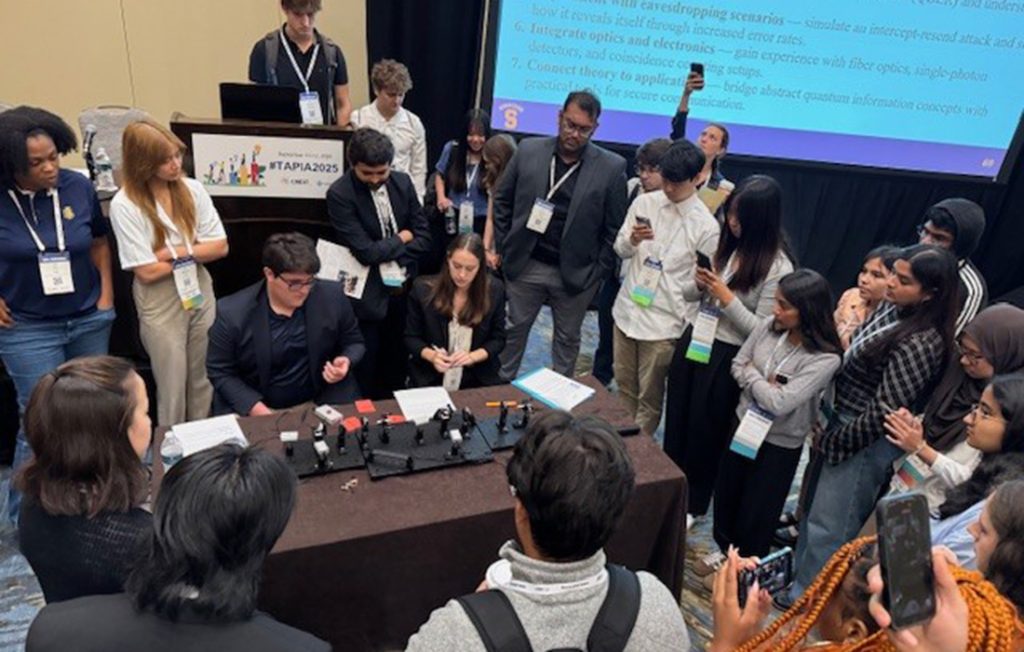
Syracuse University’s College of Engineering and Computer Science (ECS) made a powerful impact at the 2025 CMD-IT/ACM Richard Tapia Conference, leading a multifaceted outreach initiative that blended cutting-edge education with strategic recruitment. Central to this effort was the hands-on workshop “Demystifying Secure Quantum Communication: A Hands-on Workshop for All,” collaboratively developed and delivered by Electrical Engineering and Computer Science (EECS) Professors Jae Oh, Jason Pollack, and Moamer Hasanovic.
The workshop offered undergraduate computer science, electrical engineering and computer engineering majors from across the United States —as well as attending faculty—a rare opportunity to explore quantum key distribution (QKD) and the BB84 protocol through hands-on experimentation. EECS students Donovan Donlin and Sofia Macaluso played a vital role in demonstrating quantum cryptography communications, helping participants visualize and interact with quantum principles in action. Together, the Syracuse University team created an engaging experience that bridged theory and practice, making complex quantum concepts accessible and inspiring.
Beyond cryptography, the workshop highlighted the increasing importance of quantum computing in the future of engineering and computer science. Facilitators highlighted how quantum technologies are poised to transform algorithms, cybersecurity, and computational models—encouraging students to explore this emerging field early in their academic careers.
Syracuse University also hosted an information and recruitment booth throughout the conference. Recruitment specialist Michaela Karcher, EECS faculty and students met with conference attendees to share insights about graduate programs, research opportunities, and campus life. The booth served as a welcoming space for students and educators to learn more about Syracuse University’s commitment to academic excellence.
Electrical Engineering and Computer Science Professor Pankaj Jha Receives Air Force Research Laboratory Grant to Build Filters Using Quantum Defects
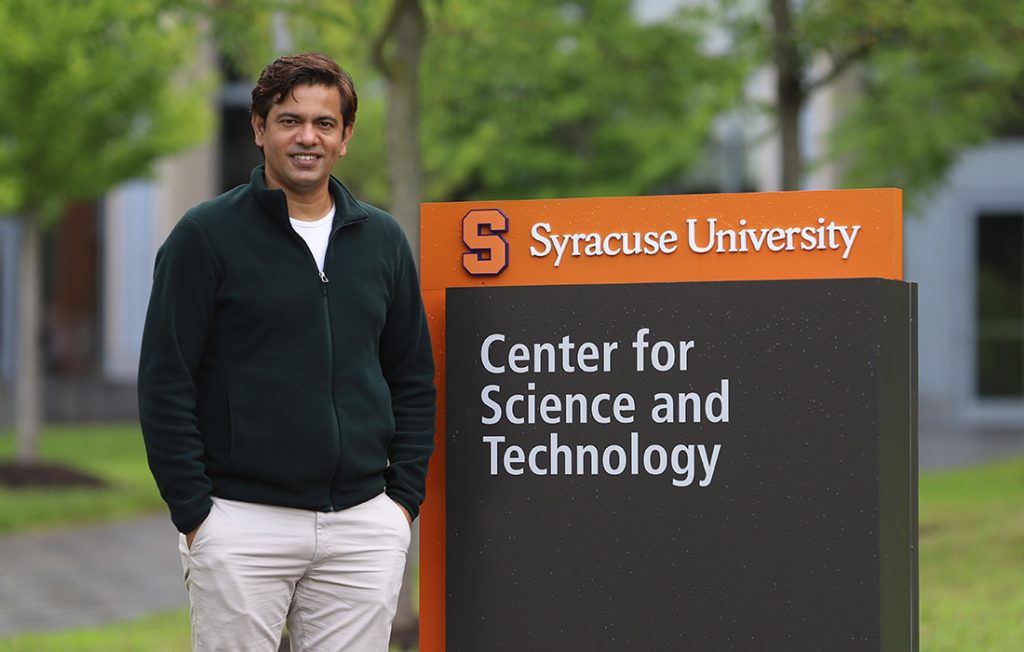
Electrical Engineering and Computer Science Professor Pankaj Jha has received a grant from the United States Air Force Research Laboratory (AFRL) to develop an absorptive atomic resonance filter (ARF) that can detect weak optical signals even in the presence of strong background (thermal/optical) noise. The filters that Jha will develop will have a sub-100 megahertz bandwidth, be electrically tunable across the sub-terahertz range, and provide sub-gigahertz speed.
An absorptive ARF is a type of filter in which a material strongly absorbs a narrow band of light, such as light resonant with an atomic transition. This absorbed light is then re-emitted at a longer wavelength, and by monitoring this re-emitted light, an ARF can separate weak optical signals from a large background.
In contrast to previous atomic filters, Jha and his team will use “atom-like” quantum defects, also known as color centers, in 2D materials. In general, defects are considered harmful to materials and device performance; however, certain defects, such as missing atoms (vacancies) at lattice sites or impurities, can be used to emit or absorb light at specific frequencies. Jha will use color centers in boron nitride, which has emerged as a promising candidate for quantum light emission, to build this filter.
“Good emitters can make good absorbers. Leveraging these color centers to detect background-limited weak optical signals adds another dimension to the exciting world of boron nitride,” Jha says.
Ethan Arnault
Institute Affiliation: Institute for Quantum & Information Sciences
Areas of Expertise:
- Superconducting devices
- Quantum technology
- Quantum states of matter
- Quantum sensing
My work leverages properties presented by newly emerging quantum and topological materials to design, fabricate and measure devices that provide advantages over typical approaches. This work spans from understanding fundamental physical properties of materials to deploying devices in real-world settings.
Honors and Awards:
Army Education Outreach Postdoctoral Fellowship (2024-2025)
J. Horst Meyer Endowment Fellowship (2020)
Graduate Program in Nanoscience Fellowship (2017)
John Chambers Fellow (2016-2017)
Selected Publications:
E.G. Arnault*, J. Chiles*, C.C. Chen, T.F.Q. Larson, L. Zhao, K. Watanabe, T. Taniguchi, F. Amet, G. Finkelstein, “Multiplet supercurrents in a Josephson circuit”, Phys. Rev. Lett., 134, 067001 (2025)
E.G. Arnault*, B. Huang*, W. Jung*, C. Fried, B.J. Russell, K. Watanabe, T. Taniguchi, E.A. Henriksen, D. Englund, G.H. Lee, K.C. Fong, “Graphene calorimetric single-photon detector” arXiv 2410:22433 (2024)
E.G. Arnault*, A.H. Al-Tawhid*, S. Salmani-Rezaie, D.A. Muller, D.P. Kumah, M.S. Bahramy, G. Finkelstein, K. Ahadi, “Anisotropic Superconductivity at KTaO3 (111) Interfaces” Science Advances, 9, 7 (2023)
E.G. Arnault, S. Idris, A. McConnell, L. Zhao, T.F.Q. Larson, K. Watanabe, T. Taniguchi, G. Finkelstein, F. Amet “Dynamical Stabilization of Multiplet Supercurrents in Multi-Terminal Josephson Junctions”, Nano Letters, 22, 17 (2022)
E.G. Arnault, T.F.Q. Larson, A. Seredinski, L. Zhao, S. Idris, A. McConnell, K. Watanabe. T. Taniguchi, I.V. Borzenets, F. Amet, G. Finkelstein, “The multi-terminal Inverse AC Josephson effect”, Nano Letters, 21, 22 (2021)
L. Zhao, E.G. Arnault, A. Bondarev, A. Seredinski, T. Larson, A.W. Draelos, H. Li, K. Watanabe, T. Taniguchi, F. Amet, H.U. Baranger, G. Finkelstein, “Interference of chiral Andreev edge states”, Nature Physics, 16 (2020)
Electrical Engineering and Computer Science Professor Bryan Kim Receives NSF CAREER Award
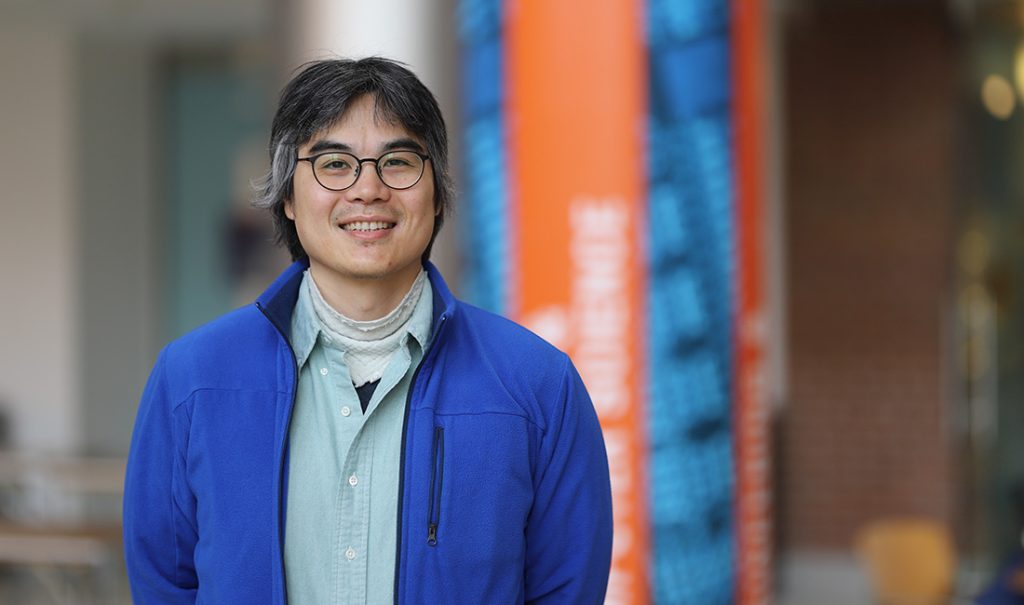
Bryan Kim, an assistant professor in electrical engineering and computer science (EECS), has received the National Science Foundation (NSF) CAREER Award, a highly prestigious award that supports early-career faculty in developing their career as outstanding researchers and educators. The award will build on his previous research on data storage systems and contribute to the field by exploring new ways to improve the memory and storage systems of computers.
Computer systems use memory to hold data temporarily and storage for long-term data. Both memory and storage have made significant improvements due to the increased demands from data analytics and machine learning applications. However, the performance of these memory and storage systems is limited by the flow of information between the software that uses data and the hardware that stores it. Kim’s research project aims to fill the gap in information by adding implicit hints between systems and devices.
The project is innovative for two main reasons: first, it will use the address of the data as an implicit agreement for the expected performance quality of accessing that data. Second, it will optimize the hardware and software systems based on this interface. The broader significance of the project is improving the sustainability and performance of computer systems and developing the educational pipeline for computer systems.
“My project aims to improve memory and storage systems that use narrow interfaces such as physical memory addresses and logical block addresses. The key insight is that there are translation layers above and below these interfaces, which enable systems and devices to pass hints while remaining compatible with older systems,” says Kim.
As part of the NSF grant, Kim plans to engage undergraduate students in research activities and develop workshops for K-12 students in collaboration with the Museum of Science and Technology in downtown Syracuse. He also plans to create and enhance tools for the undergraduate courses he teaches, which will help demonstrate how computer systems function.
“Visualization tools make it easy for undergraduate students to understand how data moves in a complex computer system,” says Kim. “This project will allow me to develop an education pipeline so we can get more students involved in research.”
Kim’s research will be integral to the field of computer storage systems and will improve the performance of these systems without needing to change how the applications work.
“Bryan’s research on collaborative operation of the memory and storage system is critical for managing the massive amount of data movement in next-generation artificial intelligence, bioinformatics, and scientific computing among many other application areas,” says Alex K. Jones, the Klaus Schroder Endowed Professor for Engineering and Department Chair of EECS. “His recognition from the NSF during this time is a testament to his great research and the important research happening broadly in EECS at Syracuse University.”
“Dr. Kim has been an incredibly valuable resource to EECS and our college due to his knowledge of new and emerging memory systems. He is a thoughtful instructor who has emerged as an especially creative scholar in this critical field. With the arrival of semiconductor manufacturing in Syracuse, we are incredibly grateful to have a thought leader of his caliber in our college,” says Dean J. Cole Smith.
“That’s one of the things about research, we’re able to look far because we’re standing on the shoulders of giants,” Kim says. “We’re building on top of other people’s work. I feel fortunate and grateful to be receiving this reward.”
Alex K. Jones
A Growing Quantum Community
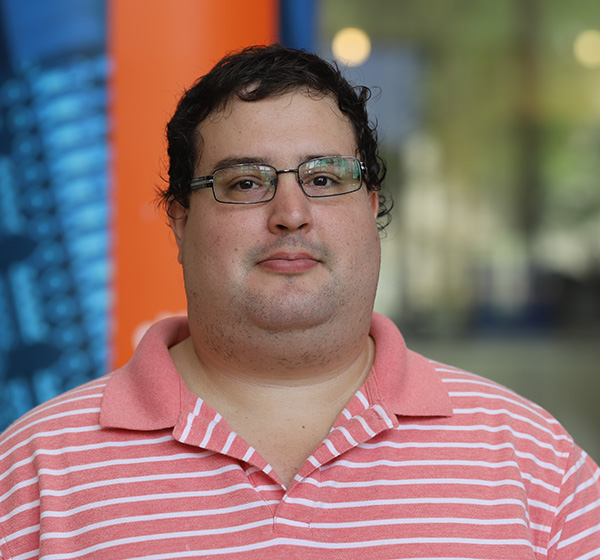
Assistant professor in electrical engineering and computer science Jason Pollack envisions a promising future for quantum at Syracuse University. As the College of Engineering and Computer Science (ECS) undergoes significant growth with renovated lab spaces, new faculty members, and groundbreaking research, it marks a transformative period not only for the college but for quantum-related fields as well.
“It’s exciting for me to be in a place where you can build a program and culture from the ground up,” Pollack says. “I’ve been telling my students that by the time they finish their grad school career, there will probably be three times as many people in quantum-related subjects as there are now. It’s very exciting that Syracuse University has put in all these resources.”
Prior to being an assistant professor in ECS, Pollack attended the California Institute of Technology for graduate school and completed post-doctoral fellowships at the University of British Columbia and the University of Texas at Austin. He became interested in how underlying quantum physics can be seen in the world around us and switched from physics to computer science, collaborating frequently with mathematicians, engineers, scientists and experts within related fields.
Pollack’s research focuses on the theory of quantum information. He aims to understand basic information and computational structures underlying quantum systems. He also collaborates with other faculty members studying quantum in ECS and across the university, particularly in discussing ideas such as random quantum walks in superconducting cavities and the design of metamaterials with exotic refractive index. This highlights the significant role theorists like Pollack play in quantum experiments.
“Without theory, experimentalists wouldn’t know what theory to work on next. There’s always a whole set of possible things to do but then there’s the question of what to do next to increase my technical prowess or understanding. You have to take some steps to convert your results or what you’d like to understand about the world.”
Pollack’s paper published in March 2024 discusses quantum thermodynamics and focuses on understanding the entanglement structure of quantum states. When two particles become entangled, their properties may remain correlated regardless of the distance. “The world is made up of atoms and molecules, but if you want to run a heat engine, you don’t have to manipulate individual gasoline molecules to run the engine. I want to understand what types of interaction a quantum system can have with an environment so I can treat it like a traditional, classical thermodynamic system. If I wait long enough, it becomes characterized by its temperature or energy.”
Pollack also has research interests in quantum decoherence, which refers to the study of interactions between the environment and quantum systems (tiny particles like atoms and molecules.) His other research program is concerned with the physics seen by observers with only limited access to, or an imperfect ability to make measurements on, the quantum state.“Syracuse’s quantum community will be changing within a few years. The plan for ECS is to grow quantum faculty, and we’re going to be on the map. Students who want interdisciplinary work can certainly find it.”
Pollack will be teaching graduate course CIS 700 “The Structure of Quantum States” where students will learn the features of quantum-mechanical systems. Starting next academic year, he will also be teaching an undergraduate course on quantum computing.
Electrical Engineering and Computer Science Professor Qinru Qiu Recognized as IEEE Fellow
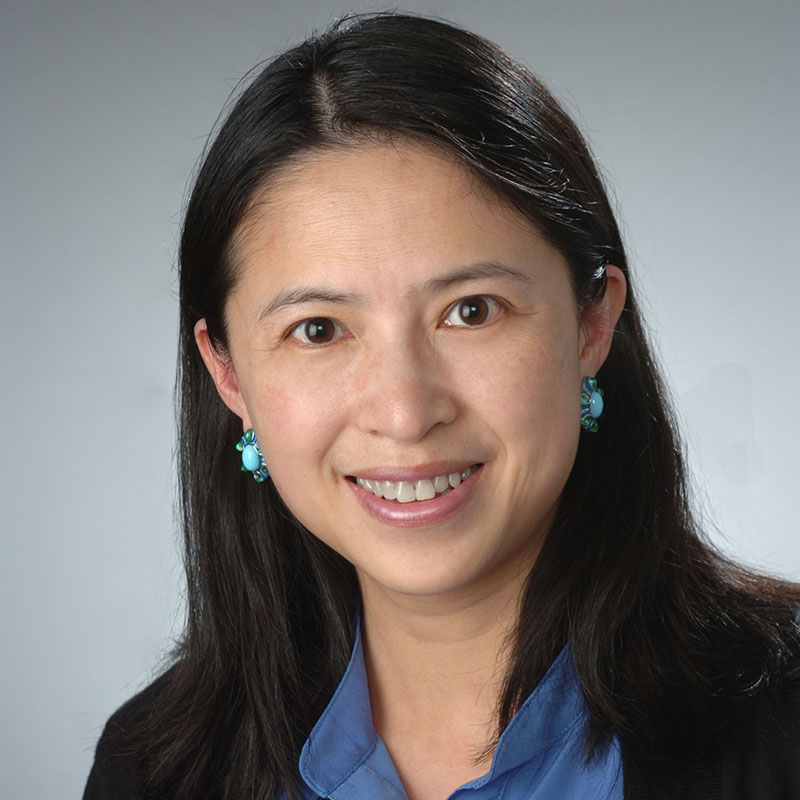
Electrical engineering and computer science professor, Qinru Qiu, has been recognized as a Fellow of the Institute of Electrical and Electronics Engineers (IEEE) for her impactful contributions to the modeling and optimization of energy-efficient computing systems.
IEEE is a global organization that is committed to advancing technology for the betterment of humanity. With over 409,000 members in more than 160 countries, less than 0.1% of voting members are chosen for elevation to this member grade each year.
Qiu’s research interest focuses on improving the energy efficiency of computing, from runtime power and thermal management of computer systems, and energy harvesting real-time embedded systems, to her recent works in brain-inspired hardware and software for neuromorphic computing. The goal of her research is to provide machine intelligence to today’s computing platforms to achieve autonomous resource management with energy and thermal awareness and explore emerging computing paradigms.
“Professor Qiu has been leading the research community to seek solutions for highly energy-efficient machine intelligence through adopting biologically inspired models and processing mechanisms,” says nominator Diana Marculescu. “Her ground-breaking research has enabled a completely new computing paradigm, which leverages the unique property of different types of spike coding to replace the numerical calculation with simple logic operations, resulting in significant energy reduction.”
“I am excited and thankful for the recognition and truly grateful for all the support that I have received,” says Qiu. “I look forward to continuing my work in developing and promoting techniques to improve the energy efficiency of emerging computing systems.”
Smart Speakers, Smarter Protection
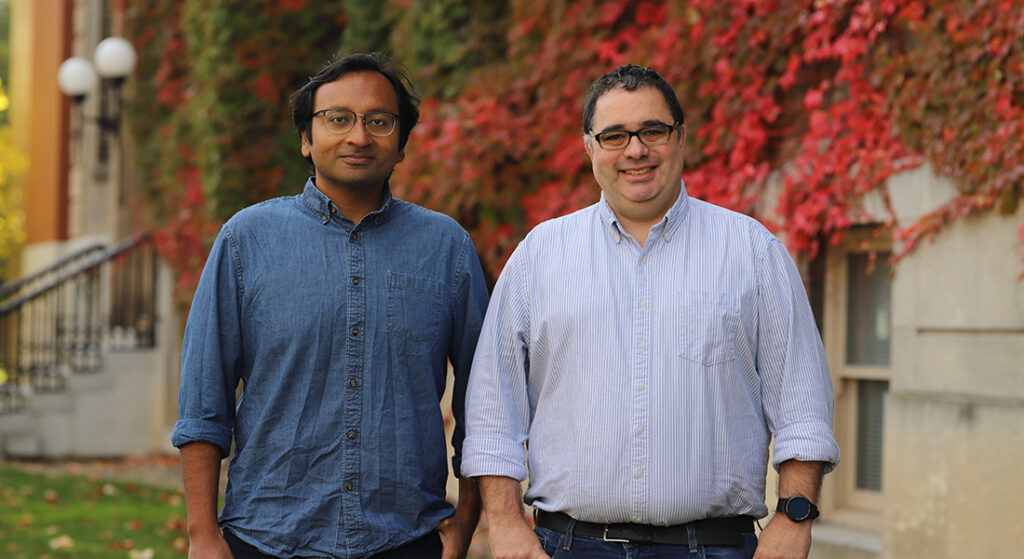
Whether you’re looking to try a new recipe, dimming the lights in your living room, or curious about the species of bacteria living inside your mouth, Amazon Alexa has got you covered. With a simple voice command, Alexa’s ability to perform various tasks or answer questions has made it widely popular, with over 40 million users in the United States alone. Despite the convenience smart speakers like Alexa offer, these devices have also raised some privacy concerns.
Amazon has been known to collect data on users which includes their shopping habits, preferences, and even their location for personalized marketing. But that’s not all. When using waking words such as “Hey Alexa” to activate smart speakers, the audio of your voice command is also recorded and stored, becoming Amazon’s property. This means that Amazon owns your voice audio and can do whatever they want with it.
“Big tech companies are using our personal information. We’re less like customers and more like their product,” says graduate student Brian Testa ’24. “I’ve always been sensitive to that. I don’t use a lot of technology at home for that reason.”
Using voice data, companies like Amazon and Google have now developed technology that poses even more threats to privacy: AI and machine learning that can determine people’s emotional state or mood from their voice. This patented technology can even pick up on feelings from emotionally neutral phrases like “What’s the weather?” Since there are no laws in place to prevent this, there’s no protection against it.
“In the US for the last five to 10 years, lots of researchers have been working on how they can use voice to infer emotions, mood or even mental health,” says assistant professor in electrical engineering and computer science, Asif Salekin. “In my own lab, we have previous works on tech that can infer mental disorders like depression, social anxiety, manic disorder, and even suicidal tendencies from one’s voice.”
While this technology can be useful in certain circumstances, most users, if not all, have not consented to having their emotions detected by smart speakers. These privacy concerns led Testa, Professor Salekin, graduate students Harshit Sharma ’26 and Yi Xiao 26, and undergraduate student Avery Gump ’24 to begin researching ways to protect users’ privacy from smart speakers.
“Consent is key,” Salekin says. “We’d still like to use smart speakers since they’re quite useful – I have them in my own home. This project was about finding a way to use these devices without giving companies the power to exploit us.”
Led by Testa, the group conducted extensive research and developed a device that can be attached to a smart speaker or downloaded as software onto a laptop. This device emits a mild noise that only the smart speaker can hear and masks the emotional tone in your voice, providing a new level of privacy protection for concerned users.
“Through the use of a speech emotion recognition (SER) classifier, a smart speaker can analyze how people are feeling based on how they sound. We created a microphone device that listens for the wake word ‘Hey Alexa’”, Testa says. “When the smart speaker activates, our device activates too and begins to emit a noise that disrupts the smart speaker from detecting your emotions. However, only the smart speaker hears this noise.”
Currently, their device masks your emotional state by presenting it as a completely different emotion. When you speak, the smart speaker may detect from your voice that you’re sad, angry, or frustrated when you’re not feeling any of these emotions. This unpredictability makes it difficult for smart speakers to accurately determine your true emotions or mood and also prevents machine learning from picking up on any patterns and mood correlations. The group hopes to improve the device’s functionality by making it mask your emotions as neutral rather than presenting them as a different emotion.
“To create the mild noise our device emits, we utilized genetic programming to identify a combination of specific frequencies that disrupt the smart speaker from determining a person’s mood,” Salekin says. “Only the speaker hears this noise, but it can hear your speech commands clearly, so the utility of the smart speaker remains intact.”
Though the sound is only detected by the smart speaker, the group wanted to see how loud it would be when the device is used. Testa played the sound in the lab when Professor Salekin was having a meeting and Salekin didn’t even realize it was playing, which showed that the noise wasn’t disruptive. Additionally, they also conducted a survey with others to see if the noise was loud enough to be disruptive.
Testa, Salekin, Sharma, Xiao, and Gump are currently working on patent submissions, form factors, and speaking with companies about commercializing their device. What sets their patent apart from similar concepts is that while past technology focused on determining people’s moods or emotions, their technology is all about protecting them. This unique approach makes their device the first of its kind.
“It was a fun project,” Testa says. “This paper was published by me and as the first listed author, I’m excited about it. I’ve been working towards my Ph.D., and this is another step towards that goal.”
“Working with the students in real-world applications and research with real results was exciting,” Salekin says. “This research has many components and the collaboration between us was great. We’re excited to see what the future for this tech holds.”
Electrical Engineering and Computer Science Professor Bryan S. Kim Receives Funding for Rack Scale Computing Research
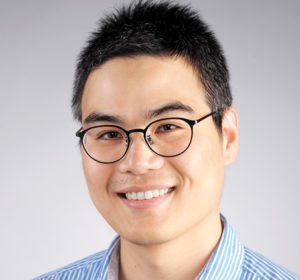
Bryan S. Kim, assistant professor in electrical engineering and computer science, has received funding from semiconductor company FADU to explore how CXL, a new open standard for connecting computer components, would transform data center applications.
With CXL, an entire rack of computers can be connected through the peripheral component interconnect express (PCIe) bus with shared memory coherency, rethinking how computers access and share data.
“CXL is still in its infancy with only limited publicly available hardware. After all, its specification is only a few years old” Kim explained. “Furthermore, how CXL and its hardware would affect software system design is completely unexplored.”
Kim’s collaborative project will investigate the fundamental technologies for building a software system with CXL memory, the designs for resilient and reliable CXL fabric, and the transformation of data center applications due to CXL.
“While there is a large research community interest in CXL, there are only a handful of research groups who have published in this area,” Kim said. “I am grateful to be at the leading front and continuing the success of this project.”
Pankaj K. Jha
Degrees:
Ph. D., Physics, Texas A&M University
Masters of Science (5-Year Integrated), Physics, Indian Institute of Technology, Kanpur (IITK)
Areas of Expertise:
- Quantum information science
- Quantum sensing and metrology
- Quantum nano- and meta-photonics
- Bio-inspired materials
- Bio-nano interfaces
- Machine learning
Jha’s research focuses on developing quantum hardware using two-dimensional materials and heterostructures, III-V semiconductors, nanostructures, soft-materials, metamaterials, and hybrid combination of these materials. His research seeks to understand fundamental characteristics of these systems through combined experimental, theoretical, and computational studies and use those findings to gain control and induce novel optical, electrical, thermal, and mechanical responses in them. These responses, in turn, are leveraged to develop transformative devices and technologies for quantum information science, quantum sensing and metrology, nanophotonics, optoelectronics, and space exploration applications. Thus, his interdisciplinary research crosses the conventional scientific boundaries to merge applied physics with electrical engineering, materials science, and mechanical engineering.
Honors and Awards:
- Tingye Li Innovation Prize for Early Career Professionals (Finalist): 2016.
- American Physical Society, Travel Grant: 2011.
- Herman F. Heep and Minnie Belle Heep Foundation Graduate Fellowship: 2010.
- Robert A. Welch Foundation Graduate Fellowship: 2009-2012.
Selected Publications:
- P. K. Jha*, H. Akbari*, Y. Kim*, S. Biswas, and H. A. Atwater, “Nanoscale axial position and orientation measurement of hexagonal boron nitride quantum emitters using a tunable nanophotonic environment,” Nanotechnology 33, 015001 (2022).
- L. Kim*, S. Kim*, P. K. Jha, V. W. Brar, and H. A. Atwater, “Mid-Infrared radiative emission from bright hot plasmons in graphene,” Nat. Mater. 20, 805 (2021).
- H. Ramezani, P. K. Jha, Y. Wang, and X. Zhang, “Nonreciprocal Localization of Photons,” Phys. Rev. Lett. 120, 043901(2018).
- P. K. Jha, M. Mrejen, J. Kim, C. Wu, Y. Wang, Y. V. Rostovtsev, and X. Zhang, “Coherence-Driven Topological Transition in Quantum Metamaterials,” Phys. Rev. Lett. 116, 165502 (2016).
- P. K. Jha*, X. Ni*, C. Wu, Y. Wang, and X. Zhang, “Metasurface-Enabled Remote Quantum Interference,” Phys. Rev. Lett. 115, 025501 (2015).
- K. E. Dorfman, P. K. Jha, D. V. Voronine, P. Genevet, F. Capasso, and M. O. Scully, “Quantum-Coherence- Enhanced Surface Plasmon Amplification by Stimulated Emission of Radiation,” Phys. Rev. Lett. 111, 043601 (2013).
Yuzhe Tang
Degree:
- Ph.D. Computer Science, Georgia Tech
Lab/ Center/ Institute affiliation:
Full Stack Security Lab (FSSL)
Areas of Expertise:
- Cyber-security and privacy
- Systems security
- Decentralized systems and blockchains
- Cryptocurrencies and finance security
- Applied formal methods and software testing
I am interested in the intersection between cybersecurity and systems. My research mission is to bring systems security and efficiency to large-scale, emerging/evolving infrastructures and applications. 1) On the cyber-security front, I am interested in applying formal methods, protocol analysis, automated program analysis, and software testing techniques to discover vulnerabilities, detect attacks, and design secure systems. I am also interested in the security-oriented measurement of large-scale systems. 2) On the systems front, I am interested in workload analysis, benchmarking, design of optimization schemes and middleware in various host systems.
My recent research focuses on decentralized systems like public blockchains. I tackle the systems security/efficiency challenges at different blockchain layers, including application-level DeFi protocol, smart contracts, down to the systems-level consensus implementations, P2P networking, and web3.0 infrastructures. I am particularly interested in discovering and fixing design flaws in blockchains and DeFi applications using formal methods. My recent research on blockchain mempool security is well-recognized in the Ethereum/blockchain developer community. Besides, I am developing and disseminating blockchain educational materials.
In the past, I worked on confidential computing, trusted execution environments, applied privacy-preserving protocols, and cloud security.
Honors and Awards:
- Ethereum Foundation Academic Grant Awardee, 2023
- Ethereum Foundation Academic Grant Awardee, 2022
- Air Force Research Lab (AFRL) Visiting Faculty Research Award, 2017
- Best Paper Award, 15th IEEE/ACM International Symposium on Cluster, Cloud and Grid Computing, 2015
- Best Paper Award, 5th International Conference on Cloud Computing, 2012
- Tung’s Oriental Scholarship, Tung’s Oriental, 2008
Selected Publications:
- USENIX Security’24: “Understanding Ethereum Mempool Security under Asymmetric DoS by Symbolized Stateful Fuzzing”, Yibo Wang, Yuzhe Tang, Kai Li, Wanning Ding, Zhihua Yang.
- WWW’24: “Characterizing Ethereum Upgradable Smart Contracts and Their Security Implications”, AR=20.2%, Xiaofan Li, Jin Yang, Jiaqi Chen, Yuzhe Tang, Xing Gao.
- CCS’21: “DETER: Denial of Ethereum Txpool sERvices”, AR=22%, Kai Li, Yibo Wang, Yuzhe Tang.
- NDSS’21: “As Strong As Its Weakest Link: How to Break (and Fix) Blockchain DApps at RPC Service”, AR=15.2%, Kai Li, Jiaqi Chen, Xianghong Liu, Yuzhe Tang, X. Wang, X. Luo.
- IMC’21: “TopoShot: Uncovering Ethereum’s Network Topology Leveraging Replacement Transactions”, AR=28%, Kai Li, Yuzhe Tang, Jiaqi Chen, Yibo Wang, Xianghong Liu.
- FSE’21: “iBatch: Saving Ethereum Fees via Secure and Cost-Effective Batching of Smart-Contract Invocations”, AR=24.5%, Yibo Wang, Qi Zhang, Kai Li, Yuzhe Tang, Jiaqi Chen, X. Luo, T. Chen.
Radhakrishna (Suresh) Sureshkumar
Degrees:
- Ph.D. in Chemical Engineering, University of Delaware, 1996
- M.S. in Chemical Engineering, Syracuse University, 1992
- B. Tech. in Chemical Engineering, Indian Institute of Technology, 1990
Experience:
- Lecturer, Massachusetts Institute of Technology, 1996-97
- Assistant Professor (1997-2002), Associate Professor (2002-2006), and Professor (2006-2009) of Chemical Engineering, Washington University in St. Louis
- Visiting Professor, University of Michigan, Ann Arbor, 2008
- Visiting Professor, University of Edinburgh, Scotland, 2008
- Visiting Professor, University of Porto, Portugal, 2008
Lab/Center Affiliation(s):
- Multiscale Modeling and Simulation Laboratory
- Complex Fluids Laboratory
Research Interests:
- Complex Fluids
- Soft Condensed Matter
- Nanotechnology
- Smart Materials
- Sustainable Energy
- Multiscale Modeling and Simulation
Current Research:
Sureshkumar’s current research focuses on (i) understanding the structure, dynamics and rheology of complex fluids and soft matter, and (ii) nanoscale science and engineering of functional materials and interfaces. Multiscale modeling and simulations as well as experiments are used to probe the response of complex soft matter and interfaces to external stimuli such as mechanical deformation caused by flow, chemical/thermal gradients and optical fields. Major ongoing research efforts target investigations of self-assembly and self-organization routes to robust nanomanufacturing of optically tunable interfaces with applications to efficient light trapping in thin film photovoltaics, self-assembly of nanoparticles with surfactant micelles and polymers, interactions of nanoparticles with cell membranes to assess their cytotoxicity, rheology of viscoelastic polymer solutions/melts, coherent structures dynamics in turbulent flows in presence of drag reducing additives, bacterial biofilm mechanics as well as signaling between bacterial and mammalian cells.
Courses Taught:
- Chemical engineering methods
- Multiscale modeling and simulation
- Structure and rheology of complex fluids
Honors:
- Invited Speaker, University of Delaware Chemical Engineering Centennial Seminar Series, Newark, Delaware (2014)
- Keynote Speaker, International Congress on Rheology, Lisbon, Portugal (2012)
- Keynote Speaker, European Congress on Computational Methods in Applied Sciences and Engineering, Vienna, Austria (2012)
- Keynote Speaker, Lorentz Center Workshop on Flow Instabilities and Turbulence, Leiden, Netherlands (2010)
- University of Michigan Competitive Sabbatical Grant (2008)
- Royal Scottish Society of Edinburgh International Exchange Award, University of Edinburgh, Edinburgh, Scotland (2008)
- Distinguished Speaker, Department of Chemical and Biological Engineering, University of British Columbia, Vancouver, Canada (2008)
- Invited Speaker, American Physical Society Annual Meeting, Baltimore (2006)
- Invited Speaker, Materials Research Society Annual Meeting, Boston (2006)
- Invited Speaker, American Institute of Chemical Engineering, Salt Lake City (2007)
- National Science Foundation CAREER Award (1999)
- ACS/PRF New Faculty Grant (1998)
- University of Delaware Allan P. Colburn Prize, Outstanding Doctoral Dissertation in Engineering and Mathematical Sciences (1996)
- University of Delaware Competitive Fellowship (1995)
Student Awards:
- Graduate Student Poster Award (Mr. Tao Cong), Society of Rheology Annual Meeting, Cleveland, (2011)
- Graduate Student Poster Award (Dr. M. Vasudevan), Society of Rheology Annual Meeting, Salt Lake City, (2007)
- Graduate Student Poster Award (Dr. R. Magan), Colloids & Surface Chemistry Division, ACS Annual Meeting, Philadelphia (2004)
- Graduate Student Poster Award (Dr. R. Magan) Nanoscale S & E Forum, AIChE Annual Meeting, Austin (2004)
Selected Publications:
Sambasivam, A.V. Sangwai & R. Sureshkumar, Dynamics and scission of rod-like cationic surfactant micelles in shear flow, Phys. Rev. Lett., 114, 158302 (2015)
Dhakal & R. Sureshkumar, Topology, Length Scales and Energetics of Surfactant Micelles, J. Chem. Phys., 143, 024905 (2015)
S.C. DeSalvo, Y. Liu, G.S. Choudhary, D. Ren, S. Nangia & R. Sureshkumar, Signaling Factor Interactions with Polysaccharide Aggregates of Bacterial Biofilms, Langmuir, 31, 1958-66 (2015)
Estime, D. Ren & R. Sureshkumar, Effects of plasmonic film filters on microalgal growth and biomass composition, Algal Research, 11, 85-89 (2015)
Israelowitz, J. Amey, T. Cong & R. Sureshkumar, Spin Coated Plasmonic Nanoparticle Interfaces for Photocurrent Enhancement in Thin Film Si Solar Cells, Journal of Nanomaterials, Article ID 639458 (2014)
Kim & R. Sureshkumar, Spatiotemporal evolution of hairpin eddies, Reynolds stress, and polymer torque in polymer drag-reduced turbulent channel flows, Phys. Rev. E., 87, 063002 (2013)
Nangia & R. Sureshkumar, Effects of nanoparticle charge and shape anisotropy on translocation through cell membranes, Langmuir, 28, 1766-1771 (2012). Cover Article
Sangwai & R. Sureshkumar, Binary interactions and salt-induced coalescence of spherical micelles of cationic surfactants from molecular dynamics simulations, Langmuir, 28 (2), 1127–1135 (2012)
Cong, S.N. Wani & R. Sureshkumar, Structure and optical properties of self-assembled multicomponent plasmonic nanogels, Applied Physics Letters, 99, 043112 (2011)
Sangwai & R. Sureshkumar, Coarse-Grained Molecular Dynamics Simulations of the Sphere to Rod Transition in Surfactant Micelles, Langmuir, 27 (11), 6628–6638 (2011)
Torkamani, S. Wani, Y. Tang & R. Sureshkumar, Plasmon-enhanced microalgal growth in mini-photobioreactors, Applied Physics Letters, 97, 043703 (2010); Highlighted in Nature, 466 799 (2010)
Vasudevan, E. Buse, D. Lu, H. Krishna, R. Kalyanaraman, A.Q. Shen, B. Khomami & R. Sureshkumar, Irreversible nanogel formation in surfactant solutions by microporous flow, Nature Materials, 9, 436-441 (2010). Commentary by M. Pasquali, Nature Materials, 9, 381-382 (2010)
D.G. Thomas, B. Khomami & R. Sureshkumar, Nonlinear Dynamics of Viscoelastic Taylor-Couette Flow: Effect of Elasticity on Pattern Selection, Molecular Conformation and Drag, J. Fluid Mech., 620, 353-382 (2009).
Trice, C. Favazza, D.G. Thomas, H.G. Garcia, R. Kalyanaraman, R. Sureshkumar, A novel self-organization mechanism in ultrathin liquid films: theory and experiment, Phys. Rev. Lett., 101, 017802 (2008)
Kim, R.J. Adrian, S. Balachandar & R. Sureshkumar, Dynamics of hairpin vortices and polymer-induced turbulent drag reduction, Phys. Rev. Lett., 100, 134504 (2008)
C M. Vasudevan, A.Q. Ashen, B. Khomami & R. Sureshkumar, Self-similar shear-thickening behavior in CTAB/NaSal surfactant solutions, J. Rheol., 52, 527-50 (2008)
Qinru Qiu
Degree(s):
- Ph.D.
Areas of expertise:
- Green computing
- Neuromorphic computing
- Machine learning
- Distributed systems
- Explainable AI
Research Interests:
- Dynamic power and thermal management for computer systems
- Power and performance optimization of energy harvesting real-time embedded systems
- Neuromorphic computing and high performance computing for cognitive applications
Current Research:
Dr. Qinru Qiu received her PhD in Electrical Engineering from the University of Southern California. She is currently a Distinguished Professor in the Department of Electrical Engineering and Computer Science at Syracuse University. Her research interests include neuromorphic computing, machine learning, and energy efficient computing. She served/serves as an associate editor for several IEEE/ACM journals including IEEE TNNLS, IEEE CAS Magazine, IEEE TCDS, IEEE TCAD, IEEE TC-CS, and Frontier on Neuroscience on Neuromorphic Engineering. She also served/serves on the organization committee and technical program committee of many IEEE/ACM conferences. Dr. Qiu is a recipient of the NSF CAREER award in 2009, IEEE Region 1 Technological Innovation award in 2020, ACM Distinguished Member in 2022, and Distinguished Lecturer of the IEEE CEDA Society (2023-2024). She is a Fellow of IEEE.
Courses Taught:
- VLSI Design
- Computer architecture
Honors:
- Distinguished Professor
- IEEE fellow
- CEDA Distinguished Lecturer (2023 – 2024)
- IEEE CAS Magazine Best Associate Editors (2023)
- Chancellor’s Citation for Faculty Excellence and Scholarly Distinction (2023)
- IEEE Circuit and System Magazine Best Associate Editors 2022
- ACM Distinguished Member (2022)
- IEEE Region 1 Technological Innovation (Academic) Award (2020)
- ACM Recognition of Service Award (2019)
- ACM SIGDA Distinguished Service Award (2011)
- NSF Career Award (2009)
- American Society for Engineering Education (ASEE) Summer Research Faculty Fellowship (2007)
Selected Publications:
1. B. Wang, Y. Ma, and Q. Qiu, “Prompt-based Domain Incremental Learning with Modular Classification Layer,” European Conference on Artificial Intelligence (ECAI), 2024.
2. N. Lin, J. Chen, R. Zhao, Y. He, K. Wong, Q. Qiu, Z. Wang, J J. Yang, “In-memory and in-sensor reservoir computing with memristive devices,” APL Machine Learning, 2024.
3. J. Liu, Y. Bu, and Q. Qiu, “Improved Efficiency Based on Learned Saccade and Continuous Scene Reconstruction From Foveated Visual Sampling,” International Conference on Learning Representations (ICLR), 2024.
4. Z. Zhang, J. Jing, and Q. Qiu, “SOLSA: Neuromorphic Spatiotemporal Online Learning for Synaptic Adaptation,” to appear on 29th Asia and South Pacific Design Automation Conference (ASP-DAC), 2024.
5. Y. Bu, J. Liu, and Q. Qiu, “Predictive Temporal Attention on Event-based Video Stream for Energy-efficient Situation Awareness,” International Green and Sustainable Computing (IGSC), 2023.
6. Q. Huang, C. Luo, S. Khan, A. B. Wu, H. Li, and Q. Qiu, “Multi-agent Cooperative Games Using Belief Map Assisted Training,” European Conference on Artificial Intelligence (ECAI), 2023.
Kristopher Micinski
Degree:
- Doctorate of Philosophy, Computer Science, University of Maryland at College Park
- Bachelor of Science, Computer Engineering, Michigan State University
Areas of Expertise:
- Programming Languages
- Static Analysis
- Formal Methods
- Foundations of Computer Security and Privacy
My research lies at the intersection of the theory and application of program analyses. Program analyses are tools that examine programs and determine (prove) facts about them. For example, a program analysis might prove that a program can never crash due to a type error. In general, however, program analyses can be arbitrarily complex and infer subtle program invariants relating to myriad applications (such as computer security).
Because program analyses must always approximate program behavior (otherwise they could solve the halting problem), there is an inherent tradeoff between analysis precision and analysis performance. Currently, program analyses are often applied only in limited contexts, as gaining acceptable performance requires too many compromises in terms of analysis precision. My current work focuses on three concurrent threads: tackling fundamental issues relating to scaling static analysis (specifically, scaling analyses to run on supercomputers rather than a single machine as all current analyses do); engineering those analyses (to allow analysis reuse); and applying those analyses to computer security (e.g., to check properties such as information flow and to support complex reverse engineering tasks).
Recent Publications:
- Symbolic Path Tracing to Find Android Permission-Use Triggers. NDSS Workshop on Binary Analysis Research (BAR 2019).
- User Comfort with Android Background Resource Accesses in Different Contexts Symposium on Usable Privacy and Security (SOUPS 2018).
- User Interactions and Permission Use on Android (CHI 2017).
Bryan S. Kim
Degree:
- Ph.D. in Computer Science and Engineering, Seoul National University
- M.S. in Electrical Engineering and Computer Science, Seoul National University
- B.S. in Electrical Engineering and Computer Science, University of California, Berkeley
Areas of Expertise:
- File and storage systems
- Computer architecture
- Operating systems
I am broadly interested in computer systems and particularly focused on data storage systems. System qualities that I care about are performance (how to store and retrieve data fast as hardware scaling stops), reliability (how to ensure the correctness as hardware becomes more error-prone), and scalability (how to scale a system as heterogeneity increases).
Recent Publications:
- Ziyang Jiao, Xiangqun Zhang, Hojin Shin, Jongmoo Choi, and Bryan S. Kim. The Design and Implementation of a Capacity-Variant Storage System. In USENIX Conference on File and Storage Technologies (FAST), pages 159–176, Feb. 2024
- Shao-Peng Yang, Minjae Kim, Sanghyun Nam, Juhyung Park, Jin-yong Choi, Eyee Hyun Nam, Eunji Lee, Sungjin Lee, and Bryan S. Kim. Overcoming the Memory Wall With CXL-Enabled SSDs. In USENIX Annual Technical Conference (ATC), pages 601–617, July 2023
- Jinhyung Koo, Jinwook Bae, Minjeong Yuk, Seonggyun Oh, Jung-Soo Park, Eunji Lee, Bryan S. Kim, and Sungjin Lee. All-Flash Array Key-Value Cache for Large Objects. In Proceedings of the European Conference on Computer Systems (EuroSys), pages 784–799, May 2023
- Manoj P. Saha, Adnan Maruf, Bryan S. Kim, and Janki Bhimani. KV-SSD: What Is It Good For? In Proceedings of ACM/IEEE Design Automation Conference (DAC), pages 1105–1110, Dec. 2021
- Junsu Im, Jooyoung Song, Juhyung Park, Eunji Lee, Bryan S. Kim, and Sungjin Lee. Modernizing File System Through In-Storage Indexing. In Proceedings of USENIX Symposium on Operating Systems Design and Implementation (OSDI), pages 75–92, July 2021
- Bryan S. Kim, Jongmoo Choi, and Sang Lyul Min. Design Tradeoffs for SSD Reliability. In Proceedings of USENIX Conference on File and Storage Technologies (FAST), pages 281–294, Feb. 2019
- Bryan S. Kim, Hyun Suk Yang, and Sang Lyul Min. AutoSSD: an Autonomic SSD Architecture. In Proceedings of USENIX Annual Technical Conference (ATC), pages 677–689, July 2018
- Bryan S. Kim and Sang Lyul Min. QoS-aware Flash Memory Controller. In IEEE Real-Time and Embedded Technology and Applications Symposium (RTAS), pages 51–62, Apr. 2017
Venkata S.S. Gandikota
Degrees:
- Ph.D. Computer Science – Purdue University
- MS Computer Science – Purdue University
- MSc Mathematics – Birla Institute of Technology and Science, Goa, India
- B.E. Computer Science – Birla Institute of Technology and Science, Goa, India
Lab/ Center/ Institute affiliation:
- Affiliate Faculty, EnCORE Institute (https://encore.ucsd.edu/)
Areas of Expertise:
- Foundations of Data Science
- Coding & Information Theory
- Lattice Algorithms
Dr. Gandikota’s research delves into the algorithmic principles of data recovery from noise, with an emphasis on its applications in fundamental machine learning problems. His primary objective is to delineate the conditions that enable successful data recovery while also devising efficient algorithms to achieve it.
Honors and Awards:
- IEEE Senior Member
- SOURCE RA Grant.
- CUSE Seed Grant.
Selected Publications:
- Combinatorial Group Testing in Presence of Deletions, V Gandikota, N Polyanskii, H Yang. arXiv preprint arXiv:2310.09613
- vqsgd: Vector quantized stochastic gradient descent, V Gandikota, D Kane, RK Maity, A Mazumdar. IEEE Transactions on Information Theory 68 (7), 4573-4587
- Support recovery of sparse signals from a mixture of linear measurements, S Pal, A Mazumdar, V Gandikota. Advances in Neural Information Processing Systems 34, 19082-19094
- Nearly optimal sparse group testing, V Gandikota, E Grigorescu, S Jaggi, S Zhou. IEEE Transactions on Information Theory 65 (5), 2760-2773
- NP-Hardness of Reed–Solomon Decoding, and the Prouhet–Tarry–Escott Problem, V Gandikota, B Ghazi, E Grigorescu. SIAM Journal on Computing, 2018
